When should my child first see a pediatric dentist?
Your child’s first dental visit should be scheduled by their first birthday. These early visits allow you to get an important start on preventive dental care that will yield a lifetime of good health. Our office offers complimentary “well baby” dental visits for children less than 24 months to help you get started.
Why is taking care of “baby teeth” so important?
Primary teeth (baby teeth) serve important functions in your child’s normal growth and development.
Primary teeth:
- Help maintain good nutrition by allowing proper chewing.
- Are involved in proper speech development.
- Maintain space for the permanent teeth and aid in proper jaw development.
- Aid in the development of good self-esteem by giving your child a healthy smile.
What can I do to make teething easier?
Teething is a natural process, but can sometimes be uncomfortable.
Some teething tips:
- Starts around 6-10 months of age, usually with the two bottom front teeth.
- Continues until about 2 1/2 when the second primary molars erupt.
- May be accompanied by: red, puffy gums; drooling; loss of appetite; difficulty sleeping; and low grade fever.
- To relieve discomfort give a cool teething ring or cold damp washcloth to chew on.
- Avoid objects that can break apart o pose a choking hazard.
- NEVER use preparations that numb the gums unless specifically directed by your pediatrician or pediatirc dentist.
When do children naturally lose their primary teeth?
Most children will begin to lose their bottom, front, primary teeth between 5 ½ and 6 ½ years old. The last back primary molars do not usually get replaced till between 12 and 14 years old.
What is Early Childhood Caries (Nursing Decay Syndrome) and how can I prevent it?
Early Childhood Caries is a serious form of tooth decay among young children that can completely destroy their teeth if left untreated. It can begin damaging the teeth as soon as they start to erupt and is caused by frequent and/or long exposure of an infant's teeth to liquids that contain sugar, such as: milk (including breast milk), formula, fruit juice and other sweetened drinks.
Early Childhood Caries is completely preventable with a few easy steps.
- Avoid at-will breast feeding once the first primary teeth start to erupt.
- Only use water in night-time and nap-time bottles.
- Most children should be weaned from the bottle by 12-14 months of age.
- Juice should be given in a Sippy-Cup and only at meals or snack time.
- Starting from birth, clean your baby’s gums and teeth after each feeding with a soft infant toothbrush or cloth.
When should I start cleaning my baby’s teeth? Should I use toothpaste?
You should start cleaning your baby’s gums before they even have teeth. Use a soft infant toothbrush or washcloth and water. Once the first tooth erupts, start brushing at least twice a day with a soft infant toothbrush and a non-fluoridated infant toothpaste. Continue to use a non-fluoridated infant toothpaste until your child can reliably rinse and spit. Once they can reliably rinse and spit you should start using a pea-size amount of fluoridated toothpaste. It is your responsibility to clean your child’s teeth during their first several years and to oversee the process though late childhood.
